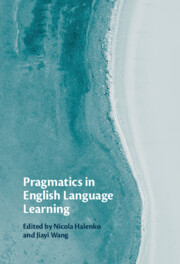Book contents
- Pragmatics in English Language Learning
- Pragmatics in English Language Learning
- Copyright page
- Contents
- Figures
- Tables
- Contributors
- Foreword
- Acknowledgements
- Introduction
- 1 Second Language Pragmatics
- Part I Pragmatics in Action
- 2 ‘Mind Your Language’
- 3 Pragmatic Development in Request Performance
- 4 Placing Oneself in the Reader’s Shoes
- 5 ‘Hey, You, Can I Loan Your Yellow Pencil?’
- Part II Instructed Pragmatics
- Index
- References
5 - ‘Hey, You, Can I Loan Your Yellow Pencil?’
Young Norwegian EFL Learners’ Metapragmatic Appraisal of Requests
from Part I - Pragmatics in Action
Published online by Cambridge University Press: 29 September 2022
- Pragmatics in English Language Learning
- Pragmatics in English Language Learning
- Copyright page
- Contents
- Figures
- Tables
- Contributors
- Foreword
- Acknowledgements
- Introduction
- 1 Second Language Pragmatics
- Part I Pragmatics in Action
- 2 ‘Mind Your Language’
- 3 Pragmatic Development in Request Performance
- 4 Placing Oneself in the Reader’s Shoes
- 5 ‘Hey, You, Can I Loan Your Yellow Pencil?’
- Part II Instructed Pragmatics
- Index
- References
Summary
This chapter presents a cross-sectional study exploring the development of young Norwegian EFL learners’ appraisal of requestive behaviour in English and their metapragmatic awareness of the linguistic and contextual features influencing request production and interpretation. The participants were in the third, fifth, and seventh grade of primary school, aged approximately 9, 11, and 13. Through an Emoticon task performed in groups, the learners appraised a selection of requests they themselves had produced, and were subsequently invited to explain their choices. Direct requests were appraised increasingly more positively with age, while the opposite was the case with conventionally indirect ones. Hints proved the most challenging to appraise and discuss due to the discrepancies between their linguistic form and speaker intentions. Metapragmatic discussions revealed a more frequent focus on the linguistic features of requesting in all age groups, with the marker ‘please’ consistently emerging as the origin of positive appraisals. Although contextual features, such as the age of and familiarity with the interlocutor, place and communicative situation, were discussed less commonly on the whole, they appeared more often with older learners, resulting in more nuanced appraisals and suggesting a developing awareness of the interplay between linguistic and contextual features.
- Type
- Chapter
- Information
- Pragmatics in English Language Learning , pp. 114 - 140Publisher: Cambridge University PressPrint publication year: 2022
References
- 1
- Cited by

